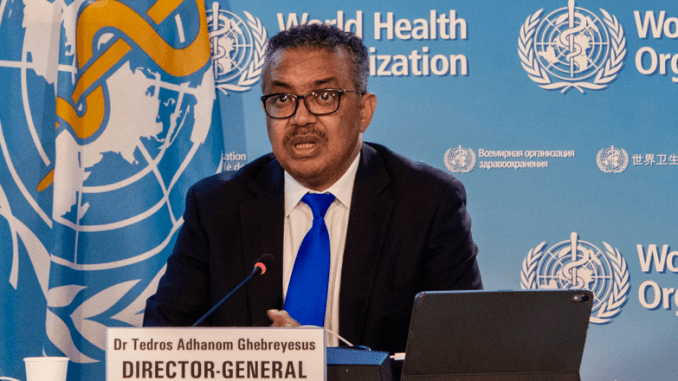
GENEVA, Switzerland, July 24, 2022 (ENS) – The ongoing multi-country outbreak of monkeypox constitutes a Public Health Emergency of International Concern, World Health Organization Director-General Dr. Tedros Adhanom Ghebreyesus declared Saturday after meeting with WHO’s Monkeypox Emergency Committee.
A Public Health Emergency of International Concern is declared when an “extraordinary event” arises that is “serious, sudden, unusual, or unexpected,” and “may require immediate international action,” WHO explains.
More than 14,500 cases of monkeypox in 72 countries that are Members of the World Health Organization have been reported to the organization this year.
“For the moment,” Dr. Tedros said, “the vast majority of cases continue to be reported among men who have sex with men.”
In June, the committee determined that, “The majority of confirmed cases of monkeypox are male and most of these cases occur among gay, bisexual and other men who have sex with men in urban areas and are clustered social and sexual networks.”
Dr. Tedros told the committee Thursday, “This transmission pattern represents both an opportunity to implement targeted public health interventions and a challenge, because in some countries the communities affected face life-threatening discrimination.”
“As many of you know from your deep engagement with these communities, there is a very real concern that men who have sex with men could be stigmatized or blamed for the outbreak, making the outbreak much harder to track, and to stop,” the director-general acknowledged.
The numbers presented by the U.S. Centers for Disease Control and Prevention are even higher than the WHO figures. The CDC reports a total of 15,848 monkeypox cases in 72 countries.
Most of those cases, 15,605, occurred in countries that have not historically reported monkeypox, and just 243 cases were reported in countries that have reported monkeypox in the past.
This is not the first time that the monkeypox virus has spread beyond Africa, where it originated. But the current outbreak is unprecedented, says Camille Besombes, a French medical doctor who specializes in infectious diseases. She is involved with Afripox, studying the virus in its endemic region.
“Monkeypox is a virus belonging to the genus Orthopoxvirus, a family that also includes smallpox. Like smallpox, it is a large DNA virus with a particular appetite for skin tissue. However, smallpox only affected humans, which meant that we were able to eradicate it through worldwide mass vaccination, whereas monkeypox is carried by an animal viral reservoir. And despite its name, the natural reservoir is not actually monkeys,” Dr. Besombes explained on The Conversation. https://theconversation.com/monkeypox-this-is-an-entirely-new-spread-of-the-disease-184085
The term “monkeypox” arose when the virus was first identified in captive primates in Denmark in 1958, but in nature, the virus is most often found in squirrels and other rodents. In 1970, the first human case of monkeypox was documented in a nine-month-old child in the Democratic Republic of the Congo, amid increasing efforts in the campaign to eradicate smallpox.” Besombes said.
The epidemiological and anthropological aspects of the virus are being explored by the teams at the Institut Pasteur Paris in collaboration with local researchers, she said. Their goal is to precisely determine the risk factors of zoonotic or interhuman transmission and ascertain why monkeypox has been on the rise since the 1980s.
The WHO Secretariat presented the global epidemiological situation, highlighting that between January 1 and July 20, 2022, there have been 14,533 probable and laboratory-confirmed cases – including three deaths in Nigeria and two in the Central African Republic – reported to WHO from 72 countries across all six WHO Regions. This number has increased from 3,040 cases in 47 countries at the beginning of May 2022.
Transmission is occurring in many countries that had not previously reported cases of monkeypox, and the highest numbers of cases are currently reported from countries in Europe and the Americas.
Since early May, cases of monkeypox have been reported in at least 50 non-endemic countries such as Spain with the most, 2,835 cases; the United Kingdom, second with 2,115 cases; and Germany third with 2,033 cases to date. The virus has infected people across the world, for instance, in: Argentina, Australia, Brazil, Canada, France, Israel, Italy, Mexico, Morocco, Portugal, Switzerland, the United Arab Emirates, the United States, and Venezuela.
“As the outbreak develops, it’s important to assess the effectiveness of public health interventions in different settings, to better understand what works, and what doesn’t,” Dr. Tedros said.
In the same family as smallpox, the monkeypox virus causes a disease with symptoms similar to smallpox but less severe, WHO explains on its website. While smallpox was eradicated in 1980, monkeypox continues to occur in countries of central and west Africa.
Monkeypox is a zoonosis, a disease that is transmitted from animals to humans. Cases are often found close to tropical rainforests where there are animals that carry the virus. Evidence of monkeypox virus infection has been found in animals, including squirrels, Gambian poached rats, dormice, various species of monkeys and others.
Human-to-human transmission is limited, with the longest documented chain of transmission being six generations, meaning that the last person to be infected in this chain was six links away from the original sick person.
This virus can be transmitted through contact with bodily fluids, lesions on the skin or on internal mucosal surfaces, such as in the mouth or throat, respiratory droplets and contaminated objects.
“WHO’s assessment is that the risk of monkeypox is moderate globally and in all regions, except in the European region where we assess the risk as high,” Dr. Tedros said. “There is also a clear risk of further international spread, although the risk of interference with international traffic remains low for the moment.”
“So in short, we have an outbreak that has spread around the world rapidly, through new modes of transmission, about which we understand too little, and which meets the criteria in the International Health Regulations,” he said.
Another factor making it harder to control this virus is the lack of information from the countries in Africa where the monkeypox virus is endemic. “The information shared with WHO by countries in West and Central Africa is still very scant,” Dr. Tedros said. “This inability to characterize the epidemiological situation in that region represents a substantial challenge to designing interventions for controlling this historically neglected disease.”
WHO Recommendations
Dr. Tedros has divided all countries into four groups for purposes of recommending how the monkeypox outbreak should be handled. The countries at greatest risk are in Group Three.
Group Three consists of countries with known or suspected zoonotic transmission of monkeypox, including those where zoonotic transmission of monkeypox is known to occur or has been reported in the past, those where presence of monkeypox virus has been documented in any animal species, and those where infection of animal species countries may be suspected, including in newly affected countries
Dr. Tedros recommends that Group Three countries establish or activate collaborative coordination, at all relevant levels, among public health, veterinary, and wildlife authorities for understanding, monitoring and managing the risk of animal-to-human and human-to-animal transmission.
Monitoring should extend to “natural habitats, forested and other wild or managed environments, wildlife reserves, domestic and peri-domestic settings, zoos, pet shops, animal shelters and any settings where animals may come into contact with domestic waste,” WHO states.
Group Three countries should also undertake detailed case investigations and studies to characterize transmission patterns, including suspected or documented spillovers from, and spillback, between animals and humans. Keep updated case investigation forms on possible exposures and modes of both zoonotic and human-to-human transmission, and share the findings of these endeavors with WHO, Dr. Tedros advises these countries.
Click here to see the World Health Organization’s full set of recommendations for countries in all four groups.
Featured image: World Health Organization Director-General Dr. Tedros Adhanom Ghebreyesus declares the current monkeypox outbreak a Public Health Emergency of International Concern, July 23, 2022, Geneva, Switzerland (Photo by Lindsay Mackenzie courtesy World Health Organization)



